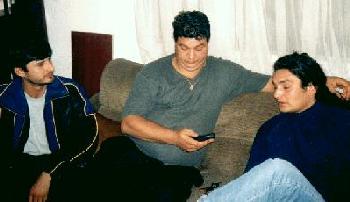We are beyond the outskirts, beyond
endless rows of public housing, beyond the highway. The paved road ends
in front of the gates of a factory, with the highest chimney I ever saw.
And there, where the world comes to an end,
begins the Misheveçka. The high embankments of the Sava to
the right, a wild and damp green growing over heaps of waste, to the left
barbed wire marking off a railway line, and below us, holes in the mud
as large as lakes.
We go on and on, and finally come up against
a form of Russian roulette: we have to turn suddenly to the left while
going up a steep slope without any view, cross the unguarded tracks hoping
no train comes by, then down the other side.
We go on through thorns and brush to
two houses in the middle of a swamp. Sunset is still about two hours away.
The first house is that of Kadri, the second
- as we later found out - is that of one of his six male brothers.
Children come running out. A girl about six,
the very image of Reska as a child, stares at us. And a unique expression
appears on her face, something no actor could ever manage to repeat: the
very peak of joy and pain together. "It's Reska!" Yet this child has never
seen her aunt, all she knows is that this impossible dream of liberation
exists. Throughout the evening, the child clings to her aunt's neck.
We enter the house. Against all the rules,
I keep my shoes on. A guest's right, certainly, but I also do it so that
they take me for a fool.
The living room. At the end, a kitchen and
a large tapestry depicting the pilgrimage to Mecca. As in every Muslim
house, a stack of mattresses for the guests. On the walls, pictures of
Kadri's father against an arid background of mountains and cactus; of Kadri's
grandfather, dressed up as an Ottoman gentleman, with a fez and a waistcoat;
of one of the children, dressed in white and covered with gold like a little
spouse.
Kadri is sitting on the sofa. He has light
skin, and could seem an Italian were it not for his name tattooed on his
arm. Thirty years old, wavy hair, enormous arms and hands, a gross belly
which he is proud of, an almost physical sign of possession and power.
Does he weigh four times as much as Reska, or more? It is hard to guess
his secret, especially because of the language barrier. He moves
stiffly, and his face is anything but expressive. At a certain point I
feel I understand something about him, as he proudly shows his portable
phone. I try to look at him simply as a very big, spoilt child. There is
nothing transcendental about his evilness, just the certainty that everybody
exists only to satisfy his whims or die.
You are welcome to use this article
on condition that you put the whole text of "Collateral Lives" on your
website and provide a link to http://www.kelebekler.com/
